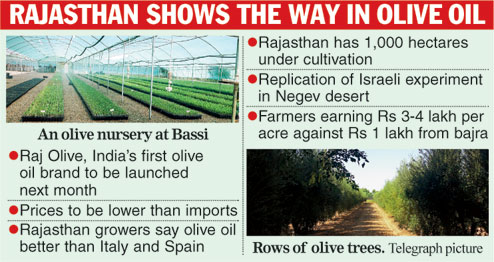Bassi (Rajasthan), Oct. 30: The Thar desert will give the country its first olive oil brand - Raj Olive - to be launched next month.
Eight years after Rajasthan decided to start olive cultivation to reduce the dependence on imports for edible oil, the desert state has decided to bring its olive oil to the market where demand outstrips imports. Rajasthan has about 1,000 hectares of olive trees.
"India imports 50-55% of the edible oil it needs and virtually all the olive oil its urban consumers use, which is about 14,000 metric tonnes. In such a market, whatever we bring would sell, but the fact is we have a really good crop here comparable if not better than imports from Spain or Italy," said Yogesh Verma, chief operating officer of Rajasthan Olive Competition Ltd (ROCL) - a joint venture between Finoles and the state government. Verma grows olives at his firm's nursery at Bassi, 35 km from Jaipur. Olive acreages are spread across mainly in Bikaner, Jalore and Sri Ganganagar districts.

In May 2006, a delegation led by the then agriculture minister Sharad Pawar had gone to Israel. Two chief ministers - Gujarat's Narendra Modi and Rajasthan's Vasundhara Raje - were asked to study the possibility of replicating Israel's success with olive plantations in the Negev desert. Since then, ROCL has been working to encourage Rajasthan's farmers to grow olives. "The movement is now bearing fruit," state agriculture minister Prabhu Lal Saini said. He hopes the brand will be launched at the Global Rajasthan Agri-tech Meet to be held in the second week of November.
The state now plans to increase olive cultivation to over 5,000 hectares over the next three years.
Imported extra virgin olive oil costs Rs 1,000 per litre, while the more popular virgin olive oil sells for Rs 700-800 a litre. Verma said Raj Olive's pricing was yet to be finalised but it "will be lower than competition by a substantial percentage".
However, analysts said imports would continue to rule the roost despite the introduction of the indigenous brand because the demand was increasing at a fast pace.
"It is forecast that India will consume about 25,000 metric tonnes by 2020, which would rise to 40,000 metric tonnes by 2025," said Manish Seth, a Delhi-based edible oil trader. The huge demand has resulted in much of the olive oil imports being of low grade.
Seven varieties of olives - Barnea, Arbequina, Cortina, Coronoiki, Frontio, Picual and Picholine - are grown in Rajasthan. However, five have proved to be particularly successful in the state's harsh climate. Farmers have started earning about Rs 3-4 lakh per acre from olive cultivation against Rs 1 lakh from growing the traditional bajra or millet.
"We now sell olive saplings not only to our farmers but to others. Northeastern states and Kerala have bought some. We hope the northeastern experiment proves successful. Kerala buys mostly for decorative purposes," Saini said.
Rajasthan, too, wants to use olive trees for decoration. "We plan to plant olive trees alongside our desert highways and have olive-covered sand dunes. We want the state's tourism to benefit from the greenery that olives are bringing besides the cash that farmers are getting," the minister said.











